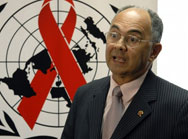The public health doctor and epidemiologist Pedro Checker is considered one of the main organizers of the Brazilian policy to respond to the HIV epidemic. He has been coordinator of the National AIDS Program twice, since its creation in 1987. In 2000, he was called to be a representative of Unaids – the UN's program to combat HIV –, working in countries such as Russia and Mozambique. He currently heads the entity's office in Brasília.
Em visit last Saturday at the Arco-Íris group, in Rio de Janeiro, where he was also with the global director of Unaids, Michel Sidibé, Pedro spoke exclusively to the website The Cape about the projects and perspectives for 2009. Among them, the centralization in Brazil of the Unaids office for all Portuguese-speaking countries; raising awareness of condom use among young people and rapid testing programs. On the issue of prevention, he makes no secrets and emphasizes that the main means is still condoms.
UNAIDS recently recognized fidelity and late initiation of sexual life as means of preventing HIV. Are couples in an open relationship more likely to contract the virus?
Yes, because the chance of contact with HIV and other infections increases. But this changes completely when condoms are used, whether in an open or closed relationship. Our parameter does not include the issue of mutual loyalty. The issue of sexual transmission of HIV must be centered on the use of condoms, which is the fundamental instrument for prevention. With this, we would be guaranteeing its consistent and widespread use by the sexually active population in the medium term, in addition to the prospect of reducing the STD epidemic; and in the long term, ensuring effective control of the epidemic.
How do you assess the growth of HIV contagion in Brazil among young people and the elderly?
This is worrying and is happening in various parts of the world, not just here. This effectively denotes an urgent need to raise awareness among the young population – especially homosexuals. But in general they have increased their prevention perspective. In Brazil, for example, the use of condoms during the first sexual intercourse has increased significantly. But among the gay population it has been a recent problem. The National Program has more recently been expanding projects and actions and, mainly, peer education.
What is your opinion of the UNAIDS partnership with the Brazilian government in exchanging technical support?
Minister Celso Amorim was with Michel and discussed strengthening this partnership, which is very positive. The minister also informed that the Brazilian UNAIDS office has become the focal point for Portuguese-speaking countries. We will even translate material from English and French to these countries, facilitating faster access.
How have you observed the growth of the practice of bareback in Brazil?
I have only been following the newspapers, but I don't know to what extent it has been bad news based on some isolated facts or current practice. I really need to delve deeper so that we can build educational projects and programs for this population.
Do you believe that rapid testing is a good investment by the Brazilian government in the fight against AIDS?
We started this process a long time ago, the new algorithm was implemented in 2005, when I was heading the National Program with the aim of facilitating diagnosis for the population that does not have access. We cannot wait, for example, for a pregnant woman in the Amazon to have her child and then receive the results from Manaus. It's useless, because we've already lost much of the prevention perspective. This will be done in regions where access does not exist or where the public health structure has difficulty providing a quick response, and I would not exclude Rio de Janeiro from this issue. There are regions where the test takes one or two months. The new algorithm allows for immediate and confirmed diagnosis in 15 minutes. This makes immediate treatment action possible. The sooner this happens, the better chance you have of survival and a quality life.
What can be effective, in terms of campaigning, to convince young people to use condoms?
I would say that peer education and education at school are fundamental. The Brazilian government has a very ambitious project. The MEC [Ministry of Education] has a leadership in this regard, of educating young people not only to use condoms, but also to have healthy sexuality. I believe that through this process we can actually achieve, in the medium term, this much desired goal.


